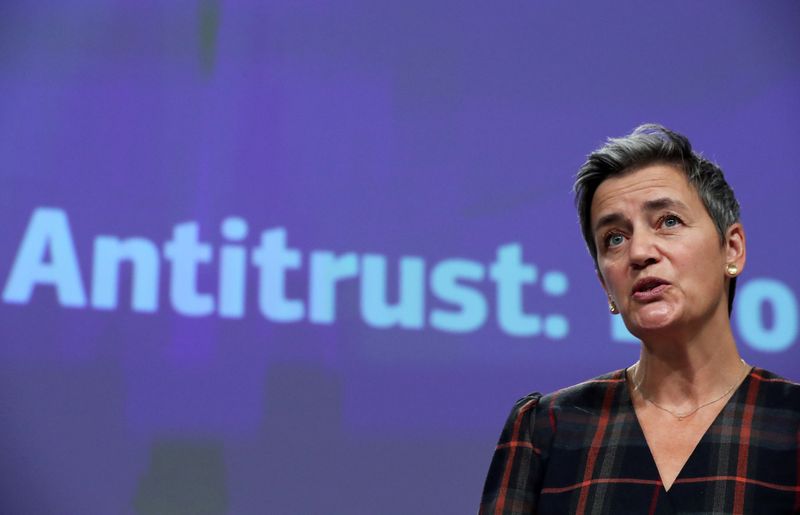By Mathieu Rosemain and Douglas Busvine
PARIS/BERLIN (Reuters) - France and the Netherlands on Thursday called for a European Union authority to regulate large tech companies such as Google (O:GOOGL) and Facebook (O:FB), whose dominance gives them effective internet gatekeeper status.
The move increases pressure on Commissioner Margrethe Vestager, who is preparing a new Digital Services Act, to set tough rules for data-sharing and ensure that marketplaces are fair and open.
The Franco-Dutch proposal, which calls for pre-emptive action to prevent power grabs by Big Tech, overshadowed a gathering of EU ministers that discussed artificial intelligence and cloud computing.
In a joint statement, French junior minister Cédric O and his Dutch counterpart Mona Keijzer said such an authority should be able to prevent tech company platforms from blocking access to their services "unless they have an objective justification."
"These platforms can hinder the entry of new companies and limit the freedom of choice for consumers and entrepreneurs," said Keijzer, the Dutch state secretary for economic affairs and climate policy.
"Our common ambition is to design a framework ... to address the economic footprint of such actors on the European economy and to be able to ‘break them open’," said O, the top digital policy official in the French government.
In response, German Economy Minister Peter Altmaier, said: "What we are talking about is upholding our European values and the functioning of our single market."
The European Commission is taking a tough line against U.S. tech giants, driven in part by antitrust cases resulting in decisions that subsequently failed to boost competition because these investigations often take several years.
Gatekeepers, such as companies with bottleneck power or strategic market status, will not be allowed to use data collected on their platforms to target users unless this data is shared with rivals, according to the draft regulation seen by Reuters last month.
The power of digital gatekeepers was one issue discussed on Thursday at an online meeting of EU digital and telecoms ministers hosted by Germany, the current EU president.
Twenty-five of the 27 EU members signed a declaration on creating a European cloud federation - a framework for the storage, use and sharing of data within the EU, Altmaier told reporters after the meeting.
This would enable the development of Gaia-X, a cloud computing initiative pioneered by Germany and France. The two countries that did not sign - Cyprus and Denmark - are expected to do so soon.

“This declaration is promising and shows the depth of the change that we witness," said Commissioner Thierry Breton. "There is a common understanding that it is vital that any data can be stored and processed in Europe, according to European rules and standards."